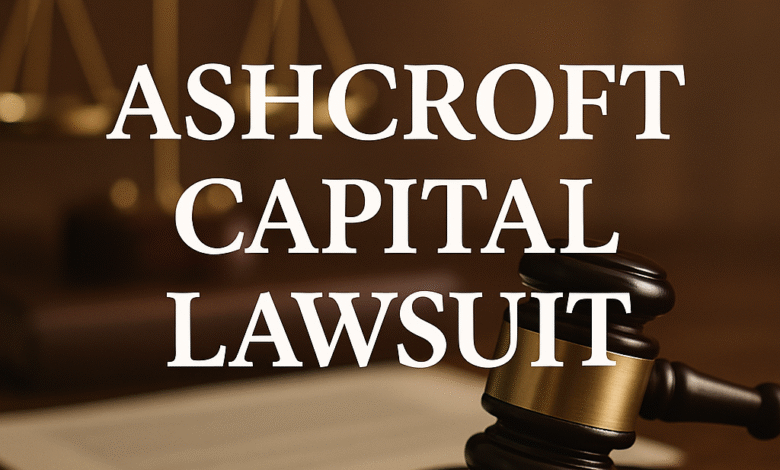Ashcroft Capital Lawsuit: What Investors Should Know About the Case and Its Wider Implications

Introduction to Ashcroft Capital and Its Role in Real Estate Investments
Ashcroft Capital lawsuit has long been recognized as a major player in the real estate investment landscape, particularly in the multifamily housing sector. Founded with the goal of acquiring, improving, and managing apartment communities across the United States, the firm quickly built a reputation as a trusted partner for investors seeking passive income through real estate syndication. Its focus on value-add opportunities—properties that could be renovated or repositioned for greater profitability—gave Ashcroft Capital a distinct niche.
What made the company especially appealing was its promise of stability in an industry often marked by volatility. Many investors turned to Ashcroft not just for returns but for its structured approach and professional management. With an expanding portfolio across multiple states, the company became a beacon for those who wanted real estate exposure without the hassle of being landlords themselves.
However, no matter how polished or experienced an investment firm might be, the world of finance and real estate is never without risks. Over the last few years, whispers about legal disputes and investor concerns surrounding Ashcroft Capital have surfaced. For those closely watching the company—or anyone thinking about investing—these developments are worth understanding in depth.
The term “Ashcroft Capital lawsuit” doesn’t just represent a legal proceeding; it encapsulates the larger conversation about investor trust, transparency, and the challenges that even established firms face in today’s unpredictable economic environment.
Understanding the Core of the Ashcroft Capital Lawsuit

When discussing Ashcroft Capital lawsuit in the investment world, it’s crucial to remember that they don’t always mean wrongdoing has been proven. Many times, lawsuits arise out of disputes between investors and management, disagreements over strategy, or even broader market conditions that spark tension between parties. In the case of Ashcroft Capital, the lawsuit discussions reportedly stem from investor dissatisfaction, questions about financial performance, and concerns about communication practices.
Real estate syndications are, by nature, complex structures. Ashcroft Capital lawsuit multiple investors pool money together, trusting a general partner or management company to make the right decisions about acquiring and managing properties. If those properties underperform or if investors feel left in the dark about financial details, frustration can mount. That frustration sometimes spills into the courtroom.
While the exact details of every claim connected to Ashcroft Capital lawsuit may not be publicly disclosed, lawsuits often reflect a breakdown in trust. Investors may believe projections were overly optimistic, or that risks weren’t communicated clearly. Conversely, the firm may argue that market conditions—like rising interest rates, inflation, or unexpected maintenance costs—caused unavoidable challenges.
What’s important to understand is that such lawsuits are not unique to Ashcroft Capital lawsuit. They are part of a broader pattern in the investment industry, where expectations collide with realities. Yet, given Ashcroft’s high-profile position, any lawsuit draws significant attention, raising questions about whether the company’s long-standing reputation can weather the storm.
Investor Reactions: Confidence, Skepticism, and Everything In Between
Whenever the word “lawsuit” is attached to an investment firm, reactions from investors vary widely. Some may panic and immediately assume the worst, while others adopt a wait-and-see approach, trusting that the firm will resolve issues responsibly. In Ashcroft Capital lawsuit case, both perspectives have emerged.
For loyal investors who have seen steady returns in the past, the lawsuit may seem like just another bump in the road. They recognize that real estate is inherently risky, and they may believe that Ashcroft’s track record speaks louder than temporary setbacks. These investors often view the company’s leadership as resilient and capable of navigating turbulence.
On the other hand, skeptics highlight the lawsuit as a red flag, arguing that it signals deeper issues in the company’s management or communication strategies. They question whether projected returns were realistic in the first place, and whether future investments will face similar problems. For these individuals, the lawsuit isn’t just about the legal claims—it’s about trust being fractured.
Then there are the undecided investors who simply want more clarity. For them, the lawsuit is less about assigning blame and more about transparency. They want Ashcroft Capital to openly address what went wrong, what corrective measures are being taken, and how the firm plans to safeguard investor interests moving forward. Their reaction underscores a critical truth in the investment world: communication is as valuable as financial performance.
The Broader Implications for the Real Estate Syndication Industry
One of the reasons the Ashcroft Capital lawsuit has gained attention is that it sheds light on larger trends in the real estate syndication industry. Over the last decade, real estate syndications have exploded in popularity. With platforms making it easier for everyday investors to participate in apartment deals, the industry has grown rapidly. But with that growth has come increased scrutiny.
Lawsuits like the one involving Ashcroft highlight the risks associated with syndications. Investors are often attracted to promises of double-digit returns, but they may not always fully understand the market risks, debt structures, or potential pitfalls tied to these deals. When returns fall short or distributions slow down, legal disputes can follow.
Furthermore, the Ashcroft case illustrates the importance of due diligence. While many syndication firms operate transparently and deliver results, investors cannot afford to take promotional materials at face value. The industry as a whole faces pressure to improve reporting practices, adopt clearer communication channels, and set more realistic expectations.
It’s also worth noting that lawsuits affect not just the firm involved but the perception of the entire industry. When a prominent player like Ashcroft Capital lawsuit faces legal challenges, it inevitably raises questions about the safety of similar investment opportunities. Competitors may find themselves under a sharper lens, and regulatory bodies may push for tighter oversight. In this sense, the lawsuit is not just about one company—it’s a wake-up call for the entire sector.
Lessons for Current and Future Investors
While the Ashcroft Capital lawsuit is a specific case, it carries lessons that extend well beyond one firm. Investors—whether they’re seasoned professionals or newcomers—can extract valuable insights from the situation.
First, transparency is non-negotiable. Before investing in any syndication or real estate partnership, individuals should demand access to detailed reports, realistic projections, and open lines of communication. If a firm hesitates to provide clarity, that hesitation itself is a warning sign.
Second, diversification is key. Even when working with reputable firms, investors should avoid putting all their capital into one deal or one company. By spreading investments across different asset classes or regions, they can better shield themselves from unexpected setbacks.
Third, lawsuits remind us that investment is never risk-free. Real estate syndications can be lucrative, but they are also tied to market cycles, interest rate fluctuations, and property management challenges. Understanding this reality helps investors maintain balanced expectations rather than being swayed by overly optimistic marketing.
Finally, investors should pay attention to how a firm responds to adversity. A Ashcroft Capital lawsuit, while concerning, is not necessarily a death sentence for a company. If Ashcroft Capital addresses concerns transparently, implements corrective measures, and demonstrates resilience, it could regain investor trust and emerge stronger. The response, more than the lawsuit itself, will shape the company’s future.
Conclusion: Beyond the Headlines
The phrase “Ashcroft Capital lawsuit” may grab attention, but the real story goes deeper than legal filings. It reflects the challenges of balancing investor expectations with market realities, the importance of transparency in financial partnerships, and the growing pains of a rapidly expanding investment industry.
Ashcroft Capital lawsuit remains a well-known name in real estate investing, and while the lawsuit has created turbulence, it also presents an opportunity for the firm to reaffirm its commitment to investors. For the industry, the case serves as a reminder that trust is as valuable as capital.
For investors, the key takeaway is not to avoid syndications altogether but to approach them with caution, research, and a demand for clear communication. The lawsuit may be specific to Ashcroft Capital, but its lessons are universal—invest wisely, diversify your risks, and never underestimate the power of transparency.
Further insights and Gain more perspective from…
HMRC Urges Parents to Claim Child Benefit for Christmas
Lake Texoma Should Be Capitalized



